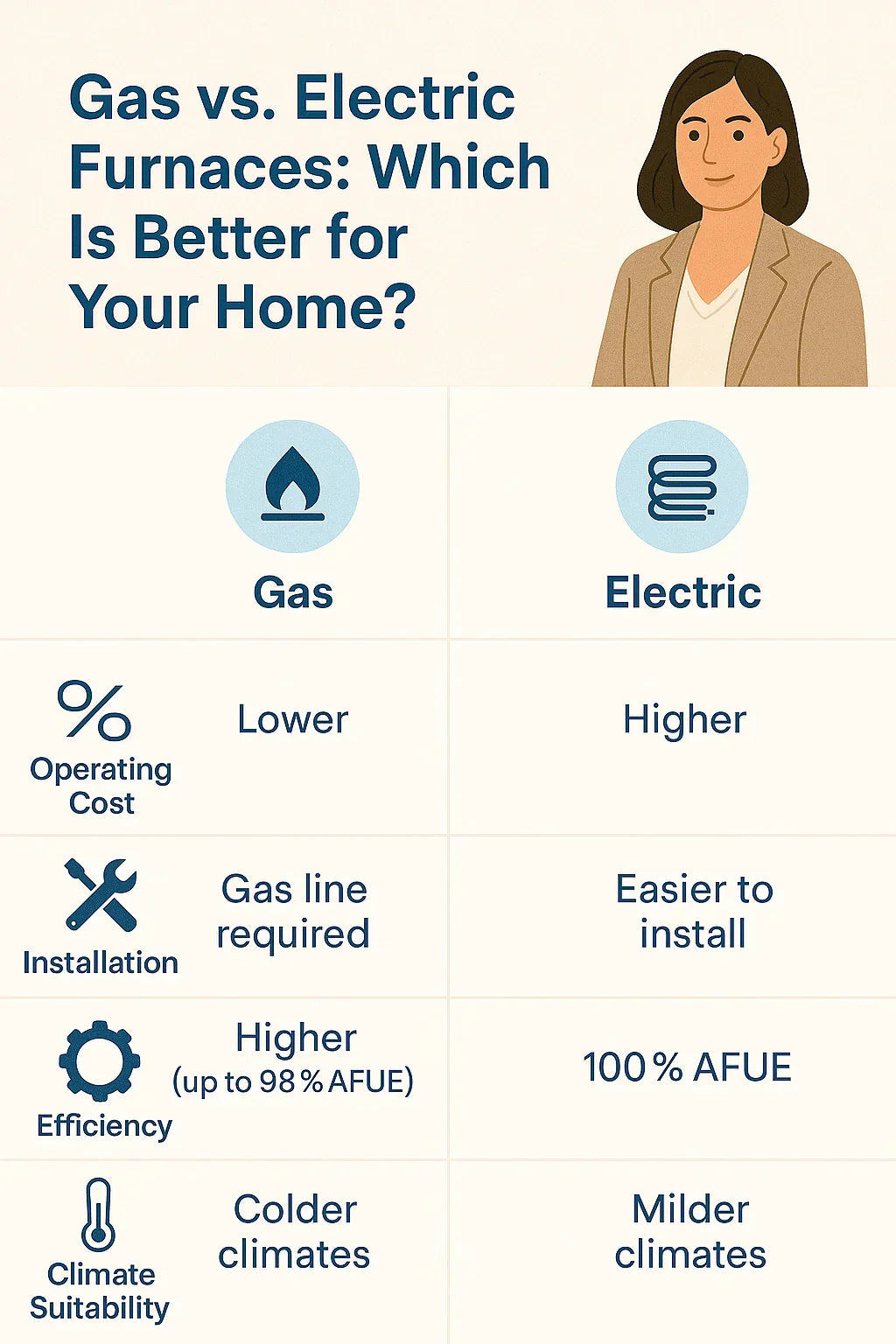🔍 Introduction: Why This Decision Matters
Choosing between a gas furnace and an electric furnace is a key decision that affects your home's comfort, energy bills, and environmental impact. Both options have pros and cons depending on your local utility rates, climate, and long-term plans.
This guide will help you compare:
-
How gas and electric furnaces work
-
Upfront and operational costs
-
Efficiency differences
-
Climate considerations
-
Safety and maintenance
-
Environmental impact
-
Which is better for your situation
🔥 How Gas Furnaces Work
Gas furnaces use natural gas or propane to create heat in a heat exchanger, which is then pushed through ducts using a blower fan. They are fast at heating and effective for cold climates.
Learn more at Energy.gov.
⚡ How Electric Furnaces Work
Electric furnaces use electric resistance heating elements to warm air, which is then circulated through the ducts by a blower fan. They do not require combustion, venting, or a gas line, making them simpler to install.
See Energy Star’s heating guide for electric furnace basics.
💰 Upfront Costs: Electric vs. Gas
-
Electric Furnaces: Typically $1,000 - $2,500 for the unit, with lower installation costs ($1,000 - $2,000) due to simpler hookups.
-
Gas Furnaces: Units cost $1,000 - $5,000, with installation ranging from $1,500 - $3,500 depending on venting and gas line requirements.
🔌 Operating Costs: Electric vs. Gas
-
Gas Furnaces: Cheaper to operate in most regions due to lower natural gas prices.
-
Electric Furnaces: More expensive to run, especially in colder climates, because electricity is typically costlier per BTU.
Example:
-
A gas furnace might cost $500/year to operate, while an electric furnace may cost $1,000+/year for the same heating load in colder climates.
♻️ Efficiency Comparison
-
Electric furnaces are nearly 100% efficient since all the electricity is converted into heat.
-
Gas furnaces typically operate between 80% and 98% AFUE.
However, lower electricity efficiency at the power plant level may reduce the environmental benefit unless your electricity comes from renewables.
❄️ Climate Considerations
-
Cold climates: Gas furnaces are typically better due to faster heat delivery and lower operational costs.
-
Mild climates: Electric furnaces can be practical if heating needs are minimal.
🛡️ Safety and Maintenance
-
Gas furnaces: Require venting, gas leak monitoring, and regular inspections for heat exchanger cracks and carbon monoxide safety.
-
Electric furnaces: Have fewer safety concerns (no combustion gases) and typically require less maintenance.
Read HVAC.com’s maintenance guide for detailed upkeep requirements.
🌱 Environmental Impact
-
Gas furnaces: Emit greenhouse gases directly during combustion.
-
Electric furnaces: Produce no on-site emissions, but overall impact depends on your electricity source.
If your utility provides renewable energy or you have solar panels, an electric furnace can be a cleaner option.
🏡 Which Is Better for Your Home?
| Factor | Gas Furnace | Electric Furnace |
|---|---|---|
| Upfront Cost | Higher | Lower |
| Operating Cost | Lower | Higher |
| Installation Complexity | Moderate | Simple |
| Efficiency | 80-98% AFUE | 100% |
| Climate Suitability | Cold | Mild |
| Maintenance | Higher | Lower |
| Environmental Impact | Higher emissions | Depends on electricity source |
✅ Decision Checklist
✅ Cold climate? Consider gas for lower operational costs.
✅ Mild climate or occasional heating needs? Electric may suffice.
✅ Access to affordable gas? Gas is typically cheaper.
✅ No gas line? Electric is easier and cheaper to install.
✅ Environmental priority with renewables? Electric may be better.
✅ Home upgrades planned? Consider heat pumps as an alternative.
💡 Conclusion: Pick What Aligns with Your Goals
Choosing between a gas and electric furnace depends on:
-
Your climate
-
Local energy prices
-
Your installation constraints
-
Environmental preferences
Both options can effectively heat your home if sized correctly and installed professionally.
👉 Next Step: Explore high-efficiency gas furnaces or consider if an electric option may better suit your home by visiting The Furnace Outlet to start your informed heating upgrade journey.
In the next article we will know more about: Understanding AFUE: What Furnace Efficiency Ratings Mean for Your Bills







